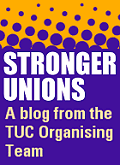Injustice is the Key Driver for Trade Unions to Fight the ConDem Government Cuts

Tracey Bent and myself are Field Organizers for CWU and work as a team. Both of us try to combine our practical organizing with theoretical work, which just means trying to understand what is really happening in our society. As opposed to what vested interest would have you believe.
My driving interest right now concerns the conditions under which people can organise and mobilize in their own collective interest and how this can be promoted in a hostile environment. This year I have been completing an MA on Industrial Relations. I have been looking at John Kelly’s Theory of Mobilisation (1998). Kelly attempts to explain the process by which a worker moves from being an isolated individual to becoming part of a collective. How and under what conditions does the isolated worker alter course and engage in sustained collective action.
At the heart of Kelly’s theory is a critical discussion of the following question: how are workers’ interests defined, and it is distinctive in Kelly that he relates this definition of interest to perceptions of injustice. There are other factors but perception of injustice is crucial.
Kelly argues that the process of moving from the individual’s sense of injustice to collective action is influenced by representatives and activists (leaders). The role of activists is central. Kelly proposes that activists help workers realise a sense of justified grievance, creating a grounded sense of real social identity, urging and legitimising collective action, against an identifiable agency (employer) in the face of hostile orchestrated criticism.
Kelly’s work provides important ideas and food for thought at this time! Trade union activists can help to take the lead and play a crucial role in galvanising and mobilising workers by explaining the flagrant injustice of the cuts. They can do so as part of an organised trade union response. We say ‘cuts’. But behind that anodyne term there is simply a massive transfer of wealth from the citizenry to the super-wealthy, who remain free of rational taxation. But the current game of neo-liberal wealth transfer is at a critical stage: it now includes a co-ordinated invasive attempt to erode social protections in Europe .
Speaking to delegates who attended this years TUC Conference, the central themes of fairness and inequality were top of the agenda. Motion 27 on establishing a High Pay Commission, driven by the CWU and crucially the development of an affiliate coalition to fight the cuts were the conduits to tackle these injustices. Kelly’s (1998) ‘mobilisation theory’ assists us as we look to galvanise the ‘perceived’ injustice of workers in the UK today into an organised affiliate mobilised response. As the factors for a societal response are present at this moment in time: open political decision making structure, instability of political alignments (Coalition Gvt), availability of political allies and divisions amongst the ruling elite.
Dave Condliffe, Year 12 Organising Academy Trainee sponsored by CWU.
Filed under: Uncategorized


